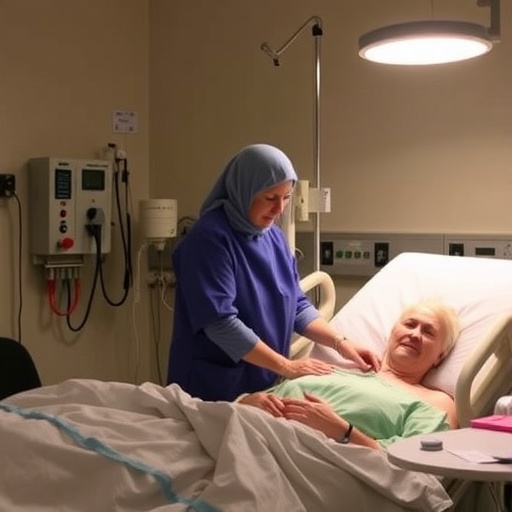In a groundbreaking study conducted by researchers T. Karaca and S. Havlioğlu, the intricate relationship between spiritual support perceptions and attitudes towards death among intensive care nurses in Turkey has been thoroughly explored. This research, documented in the forthcoming article in BMC Nursing, delves into a subject that is often overlooked in medical inquiry, yet pivotal in understanding the emotional and psychological underpinnings of healthcare professionals operating in high-stress environments such as intensive care units (ICUs).
Intensive care nurses are constantly confronted with the reality of life and death, navigating the emotional turbulence that arises from their daily interactions with patients facing critical health challenges. The study suggests that spiritual support plays a crucial role in shaping these professionals’ perspectives on death, influencing not just their well-being but also the quality of care they provide. By analyzing how these nurses perceive spiritual support within their work environments, valuable insights are revealed about the necessary conditions for nurturing both mental health and patient care excellence.
The research engaged a diverse sample of intensive care nurses from various hospitals across Turkey, providing a comprehensive overview of spiritual support perceptions in this specific demographic. Participants were asked about their beliefs, their experience with death in the ICU setting, and how their spirituality helps them cope with the emotional demands of their roles. This multifaceted approach allowed researchers to identify patterns that might inform future training and support programs for nursing professionals.
One of the key findings of the study is the recognition that healthcare professionals often derive strength from their personal beliefs and spirituality when faced with the anguish of losing patients. Many nurses reported that their faith or spiritual practices provided them with a framework for making sense of death, helping them to maintain a sense of purpose amidst the sorrow inherent in critical care. This aspect of spiritual support was not only beneficial for the nurses themselves but also positively impacted their interactions with patients and families grieving impending loss.
Additionally, the findings indicate a need for institutional support systems that validate and facilitate the spiritual needs of nursing staff. Currently, many ICU environments prioritize clinical competence and technical skills over emotional and spiritual well-being. Karaca and Havlioğlu’s work highlights the importance of integrating spiritual care into the overall framework of nursing education and practice, emphasizing that a nurse’s psychological health is just as important as their clinical abilities.
Through qualitative analyses, the researchers uncovered that many nurses expressed a desire for deeper discussions around death and dying within their teams. Many felt that addressing these topics could help not only in their personal coping mechanisms but also in fostering a collective understanding of grief and loss. Such dialogues can serve as therapeutic outlets, providing nurses with a sense of community and shared experience as they navigate the challenging landscape of critical care.
Interestingly, the study also explores how cultural factors in Turkey shape the perceptions of death among healthcare professionals. In a country where family ties and cultural expectations profoundly influence individual beliefs about mortality, the role of spirituality in coping with death takes on added significance. This cultural context enriches the understanding of how intensive care nurses experience and interpret spiritual support and its implications for their professional roles.
In presenting these findings, Karaca and Havlioğlu shine a light on an often overlooked aspect of nursing—spirituality. They argue for a re-evaluation of current healthcare practices that marginalize emotional and spiritual care, calling for a paradigm shift that recognizes these elements as central to the nursing profession. This perspective aligns with a broader trend in healthcare towards more holistic and integrated approaches that prioritize emotional and spiritual dimensions alongside physical health.
The implications of their findings extend beyond personal experience; they have potential consequences for policies surrounding nurse training, healthcare practices, and institutional support. By advocating for the inclusion of spiritual care education in nursing curricula, the researchers hope to inspire a new generation of healthcare professionals who are equipped to handle both the technical and emotional challenges of their work.
Furthermore, the study calls attention to the potential benefits of offering psychological and spiritual counseling services within healthcare institutions. By creating environments that support the emotional well-being of their staff, healthcare institutions can foster resilience in nurses, which in turn can lead to better patient outcomes. Empowering nurses to engage with their own spirituality and emotional needs could transform the landscape of critical care nursing.
As the research by Karaca and Havlioğlu unfolds, it offers essential insights not only for healthcare practitioners in Turkey but for nurses worldwide grappling with similar experiences. In a profession where emotional resilience is crucial, understanding the dynamics of spiritual support could pave the way for a more compassionate and effective healthcare system.
In conclusion, the exploration of spiritual support perceptions and attitudes towards death among intensive care nurses reveals that these elements are deeply intertwined with the practice of nursing. As healthcare continues to evolve, the findings from this study advocate for a recognition of the complex emotional realities faced by nurses. By prioritizing spiritual care, the healthcare community can enhance both the well-being of its professionals and the quality of care delivered to patients.
Subject of Research: Spiritual support perceptions and attitudes towards death among intensive care nurses in Turkey
Article Title: The spiritual support perceptions and attitudes towards death among intensive care nurses in Turkiye.
Article References:
Karaca, T., Havlioğlu, S. The spiritual support perceptions and attitudes towards death among intensive care nurses in Turkiye.
BMC Nurs 24, 1437 (2025). https://doi.org/10.1186/s12912-025-04048-y
Image Credits: AI Generated
DOI: https://doi.org/10.1186/s12912-025-04048-y
Keywords: Spiritual support, attitudes towards death, intensive care nurses, Turkey, emotional well-being, healthcare professionals, nursing education, holistic care.
Tags: attitudes towards death in nursesemotional well-being of ICU nursesintensive care nursingmental health in nursingnurse-patient relationships in ICUsnursing care in critical environmentsperceptions of death among healthcare professionalspsychological impact of death on nursesspiritual beliefs of intensive care staffspiritual support in healthcarespirituality and patient careTurkey nursing study





